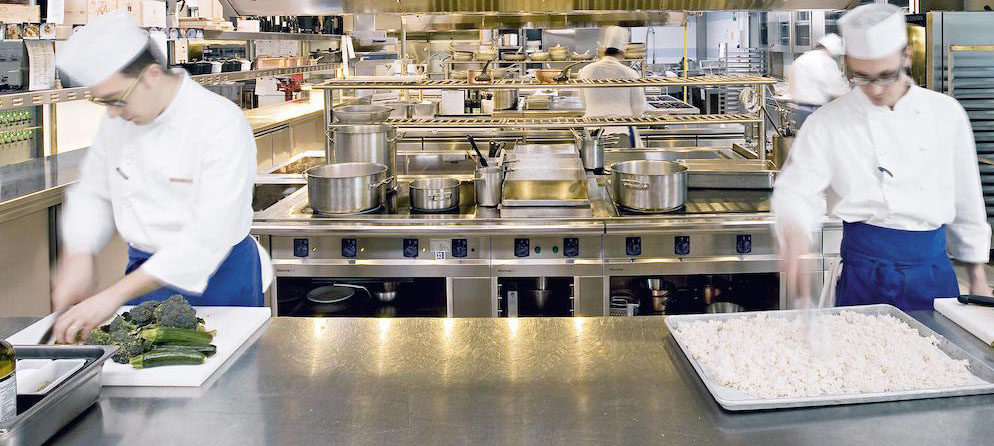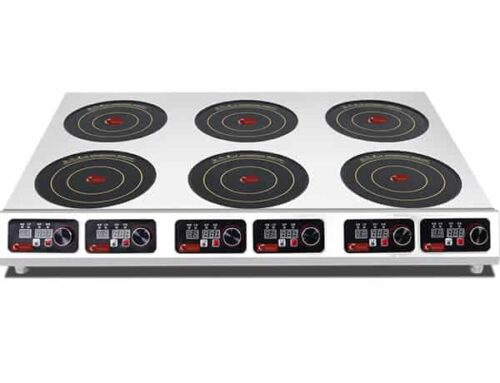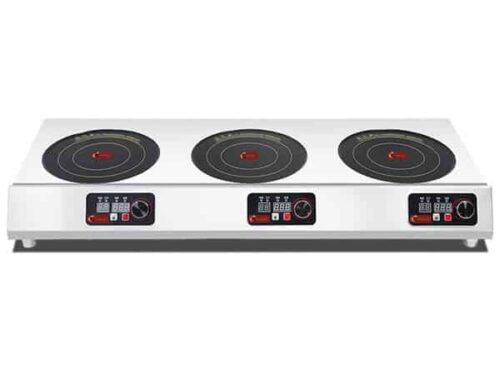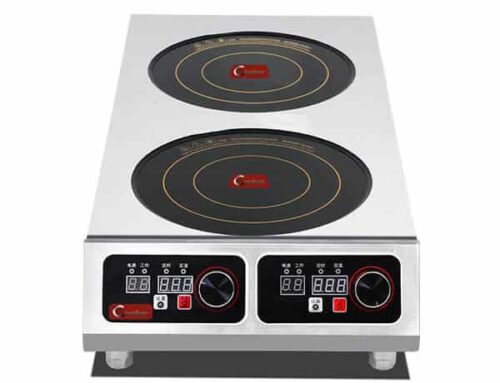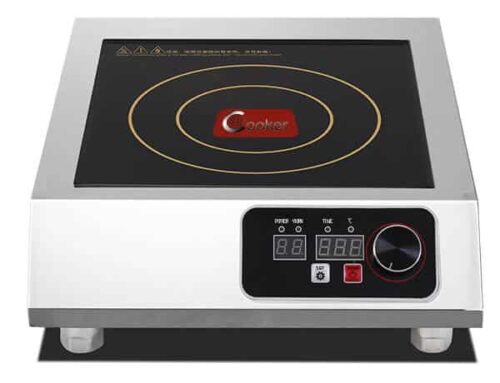Induction Countertop Cooker: Does It Require Specific Cookware?
Yes—an induction countertop cooker requires specific cookware to function properly, as it relies on electromagnetic induction to heat cookware directly (not the cooktop surface). Only cookware made of ferromagnetic materials (metals that respond to magnets) will work, while non-magnetic materials will fail to heat or trigger the cooktop’s safety sensors. For AT Cooker’s commercial induction countertop cooker models, this requirement is critical for efficiency, safety, and consistent cooking results. This guide details the exact cookware needed, incompatible materials to avoid, and how to ensure your existing cookware works—plus AT Cooker’s recommendations for optimal performance.
Compatible: 304# Stainless Steel
Incompatible: Aluminum
Incompatible: Glass/Copper
Requirement: Flat Magnetic Base
1. What Cookware Works with an Induction Countertop Cooker?
Induction technology works by creating a magnetic field that heats ferromagnetic cookware. The only cookware that functions properly falls into three categories, all verified to work with AT Cooker’s induction models:
- Cast Iron: Naturally magnetic and highly conductive, cast iron is ideal for induction cooking. It retains heat evenly, making it perfect for searing, simmering, and frying. AT Cooker recommends cast iron pans with a smooth, flat base (no ridges) for maximum contact.
- 304# Stainless Steel (Magnetic Grade): Not all stainless steel works—only grades with sufficient iron content (like 304#) are magnetic. AT Cooker’s commercial cookware line uses 304# stainless steel, which is compatible with all induction countertop cookers and resistant to corrosion from commercial use.
- Enamel-Coated Ferrous Metal: Pans with a ferromagnetic core (cast iron or magnetic stainless steel) coated in enamel work well. The enamel prevents rust and adds non-stick properties, while the core enables induction heating. This is a popular choice for commercial kitchens balancing durability and easy cleaning.
Most compatible cookware is labeled “induction-ready” or “induction-compatible” for clarity. For example, AT Cooker’s 12-inch induction-ready stainless steel pan is explicitly designed for use with its induction countertop cooktop models, ensuring seamless performance.
“We switched to AT Cooker’s 304# stainless steel pans for our induction countertop cooker, and the difference was night and day. Our old aluminum pans didn’t heat at all—now, the stainless steel ones boil water in 2 minutes and cook stir-fries evenly. They’re also durable enough for our busy diner’s 10-hour shifts.”
2. What Cookware Does NOT Work with Induction Countertop Cookers?
Non-magnetic materials cannot interact with the induction cooktop’s magnetic field, so they either fail to heat or cause the cooktop to display an error code. Common incompatible materials include:
Using incompatible cookware can trigger safety features on AT Cooker’s induction countertop cookers—for example, the unit may shut off or display a “no pan detected” error to prevent overheating. A café owner noted: “We tried using an old aluminum pot once, and the cooktop immediately beeped and turned off. It saved us from damaging the equipment.”
3. Key Features of Compatible Cookware for Optimal Performance
Even with the right material, cookware needs specific design features to work well with an induction countertop cooker:
- Flat, Smooth Base: The base must make full contact with the cooktop’s surface (minimum 70% coverage) to avoid hot spots. Warped or ridged bases waste energy and cause uneven cooking. AT Cooker recommends bases with a thickness of 2–3mm for commercial use, as thinner bases warp easily.
- Matching Size to Burner: The pan’s diameter should match the induction burner’s size (e.g., a 10-inch pan for a 10-inch burner). Too-small pans (e.g., 6-inch pan on 10-inch burner) trigger power reduction, slowing heating. AT Cooker’s induction countertop cookers specify minimum pan sizes (e.g., “no less than 22cm” for some models) to ensure performance.
- Commercial-Grade Durability: For high-volume use, cookware must withstand frequent heating/cooling cycles. AT Cooker’s compatible cookware uses thick-gauge metal (3mm+ for stockpots) to resist denting and warping, even with 8–12 hours of daily use.
4. How to Test If Your Existing Cookware Is Compatible
You don’t need to buy new cookware immediately—use these simple tests to check compatibility:
- Magnet Test (Most Reliable): Place a refrigerator magnet on the pan’s base. If the magnet sticks firmly, the cookware is ferromagnetic and compatible. If it slides off or doesn’t stick, it won’t work. This test works for all cookware types, from pans to stockpots.
- Cooktop Test: Place the pan on the induction countertop cooker, add 1 cup of water, and select a high heat setting. If the water boils within 5 minutes, the cookware is compatible. If the cooktop beeps, shows an error, or the water doesn’t heat, it’s incompatible.
- Check for Labels: Look for engravings or stickers like “Induction-Ready,” “Induction-Compatible,” or “Works with Induction Cooktops.” Many high-quality brands (including AT Cooker) clearly mark compatible products.
AT Cooker’s customer service team also offers free compatibility checks—send a photo of your cookware’s base, and they’ll confirm if it works with their induction countertop cookers.
5. AT Cooker’s Recommendations for Induction Countertop Cooker Cookware
To maximize the performance of your induction countertop cooker, AT Cooker recommends its own line of compatible cookware, designed to work seamlessly with its induction models:
- AT-12SS Induction-Ready Stainless Steel Pan: 12-inch diameter, 304# stainless steel, flat base—ideal for sautéing and searing in commercial kitchens.
- AT-20CI Cast Iron Dutch Oven: 5-quart capacity, enamel-coated, compatible with induction—perfect for slow-cooked soups and stews.
- AT-24ST Stainless Steel Stockpot: 24-quart capacity, thick-gauge 304# steel—matches AT Cooker’s 5KW induction countertop cooker for batch cooking.
These products are engineered to meet the specific power and size requirements of AT Cooker’s induction cooktops, ensuring 90–95% energy efficiency and consistent heating. A hotel kitchen manager said: “We use AT’s stockpot with their induction countertop cooker to make 20 gallons of soup daily. It heats evenly, and the stainless steel is easy to clean—saves us 2 hours of prep time.”
Why Cookware Choice Matters for Induction Countertop Cookers
Using the right cookware isn’t just a “requirement”—it directly impacts your kitchen’s efficiency and costs:
- Energy Efficiency: Compatible cookware maximizes induction’s 90–95% efficiency. Incompatible pans waste energy by failing to heat, increasing utility bills.
- Cooking Quality: Flat, magnetic bases ensure even heating—no burnt spots or undercooked food, reducing waste in commercial settings.
- Equipment Longevity: Using compatible cookware prevents the induction cooktop’s sensors from overworking, extending its lifespan (AT Cooker’s models last 7+ years with proper cookware).
For businesses investing in an induction countertop cooker, pairing it with the right cookware is a small upfront cost that delivers long-term savings and better performance.
Get AT Cooker Induction Cookware Compatibility Check
Share photos of your existing cookware or your cooking needs (e.g., “batch soup prep” or “daily searing”), and we’ll confirm compatibility or recommend the best induction-ready cookware for your AT Cooker induction countertop cooker.
